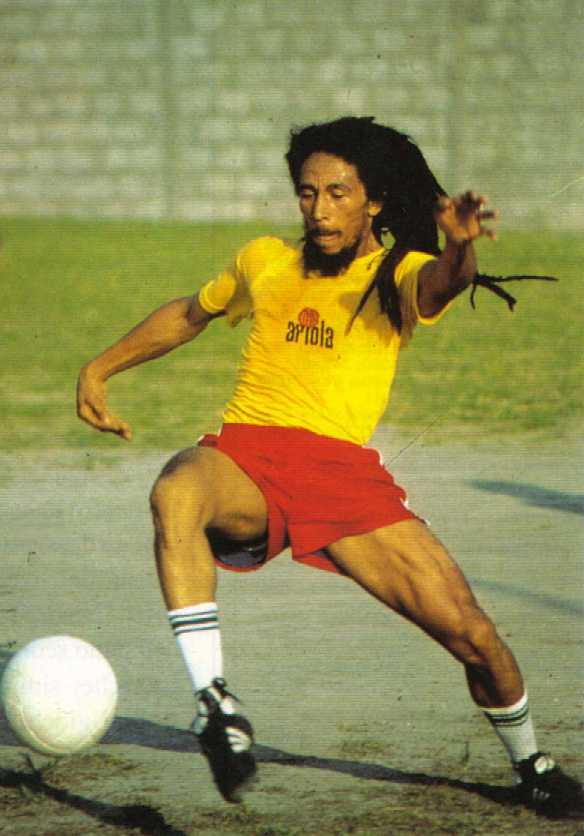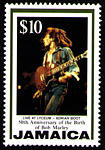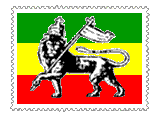
Massive Reggae 6
| Massive Reggae 6 |

Leo Vidigal

Bob Marley was in Brazil only once, in March 1980. On his 50th birthday, Massive Reggae gathered exclusive material related to his visit to Rio de Janeiro.
ob Marley, Junior Marvin (guitarist of the Wailers), Jacob Miller (vocalist of Inner Circle), Chris Blackwell (director of Island Records) and Blackwell's wife, Natalie, came to Brazil in a private jet to participate in festivities marking the Brazilian launch of the German label Ariola. Island Records, the original recording studio of the Wailers was at that time a part of Ariola. Marley interrupted recording sessions for the album "Uprising" to come to Brazil. On a refueling stop in Manaus (in the middle of the Amazon forest), the jet was held up for a couple of hours. The military government certainly didn't like the looks of the 'smoky' group. But after some negotiations the authorities allowed them to leave -- but without their work visas, which upset those who wanted to see impromptu performances of Marley in Brazil. After stopping once more in Brasilia, they quickly took off for Rio de Janeiro.
They arrived at the Santos Dumont Airport in Rio at 6:30 p.m. on Tuesday, March 18 and were immediately thronged with reporters. Marley was most known at that time as the author of "No Woman No Cry" the song covered by Gilberto Gil which had sold 500,000 copies in Brazil. Marley's first comments were about Brazilian music, "Samba and reggae are the same thing, they have the same feeling of African roots." About Jah, the Rastafarian god, he only said, "He's like your god, few people know Him." Tired from the trip, the group then quickly went to the Copacabana Palace where they would stay while in Brazil.
The following morning they set out to explore the "Marvelous City" including a stop at the shantytown Rocinha which they thought was quite similar to the ghettos of Jamaica. Having not brought a cook to prepare I-tal fare, Marley, Marvin and Miller drank only fruit juices. According to a Brazilian who accompanied them, each of them drank fifteen glasses of juice and Marley liked mango and passion fruit the best. After the trip to the shantytown, the three went looking for sporting goods stores to buy uniforms and other equipment. Music instruments were not forgotten either, they bought guitars, maracas, atabaques and cuícas (Brazilian percussion instruments). The sporting goods made their debut at the famous soccer game at Chico Buarque's place.
At 4:00 p.m. the Jamaican trio arrived at KM 18 of Sernambetiba Avenue, three hours late. Officials from Ariola were having an animated soccer game against some of the musicians from the Brazilian recording studio like the host, Chico Buarque, Toquinho, Alceu Valença and others. As soon as they arrived the teams were rearranged and became Marley, Junior Marvin, Paulo César Caju, Toquinho, Chico and Jacob Miller on one side and Alceu Valença, Chicão (from the band Jorge - at that time still - Ben) and four others from the Brazilian studio. Before the start of the game, Marley was given a Santos #10 jersey and he smiled saying "Pelé" explaining that he too played all positions. But Marley played the attack position and the score was 3 to 0 for his team with goals by him (documented on TV - see a picture of this match above) Chico and Paulo César. César played in the 1970 World Cup and was greeted warmly by Marley who said, "I'm a fan of your playing," to which César replied, "And I, your music." Marley remarked about that world championship which had made a mark on the reggae island, "Rivelino, Jairzinho, Pelé.... Brazil is my team. Jamaica likes soccer because of Brazil." But the main reason the Jamaicans were in Brazil was for the record label party so they returned to the hotel shortly after the end of the game.
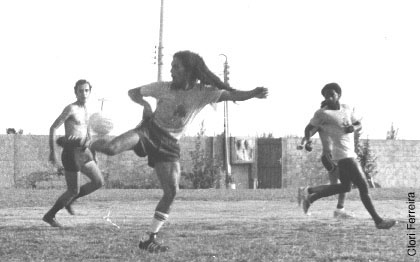
The party was held on the same day, March 19, at the top of Urca Hill. There were more than 1000 invited and uninvited guests who were treated to fire eaters, fortune tellers and fireworks. Marley arrived at 10:00 p.m. with his friends and went directly to a reserved table. Very tranquil despite being besieged, he spoke with Morais Moreira, Marina and the players from the soccer game. People thought it strange that he did not drink alcohol, but it was understood that this was because of his Rasta convictions. Baby Consuelo, who had done a version of "Is This Love" tried to greet Marley, but was unsuccessful. After discussions with the directors of the recording company, Marley moved on to watch Morais Moreira's show which started at 11:00 and filled up the dance floor. The agitation was such that Marley must have felt the meaning of the expression "Rio Babylon". The overall hope was that Marley would take the stage for an impromptu performance. Moreira called Consuelo to the stage to sing his version of Marley's song hoping that would persuade Marley to perform. But by that time Marley was already leaving and dragging with him reporters, photographers and bystanders, speaking to the journalists while making his way to the cable car (used to get down the hill).
A press conference was planned for the following morning but ended up being extremely rushed because the journalists arrived late and Marley's departure was scheduled for 4:00 p.m. that same day. About Brazilians he said, "It's easy to see that the people here have rhythm and feeling, not only in the way they move but in speech and the interest they show through music in whichever of its manifestations." For him, the message of reggae is very important, "Musicians must be spokespeople for the oppressed masses. In our case, the responsibility is even greater because of our religious beliefs. The philosophy of reggae itself explains all of this. Reggae sprang from the ghettos and has always been loyal to its origins, taking the world a message of revolt, protest and a call for human rights." The world around him was seen in bright colors, "The apocalypse is in the streets, in the daily life of everyone. It's my people that suffer, the man on the street, the poor, It's them that I speak of." However, he was prophetic in his optimism about reggae's future: "Reggae isn't a fad, it's now having a ska revival. The people who listen to reggae are the young generation, even whites. This is healthy as is a well watered seed, it's not a fad. And it's going to grow - just you wait, mon." Marley and his friends left for Jamaica that same afternoon, Thursday, March 20.
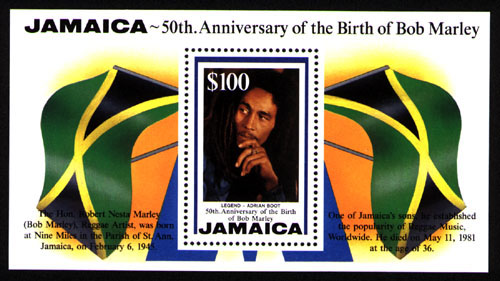
Junior Marvin told Massive Reggae that during his visit, Marley composed various songs that had been unfinished. He also said that the group had planned to include Brazil in their world tour that was scheduled to start in late 1980 and that Inner Circle would open the shows, all of which was covered in various newspapers at the time. But on March 23, two days after they returned to Jamaica, Jacob Miller was killed in a car accident in Kingston. By the end of the year, Marley would increasingly feel the symptoms of the disease that would take his life in May 1981.
The dream of a Marley show in Brazil was never to become a reality, but at least we had the opportunity to see another side of his personality, showing that away from the stages and studios he was like everyone else. All of the newspapers that covered his visit called attention to the fact that he was always accessible and willing, not the stereotypical "star". This trip to Brazil ended up being forgotten in Marley's biography because of his concert at the Zimbabwean independence celebration which took place less than a month after his visit. But for whoever feels his music hit with all of its force without feeling pain, his visit is a priceless memory.
Translation from Portuguese: Claudio Rocha and Dawn Kelly.
The quotes from Bob Marley appeared in the following newspapers: Jornal do Brasil, O Globo, Folha de São Paulo and Jornal da Tarde
Collaboration: Mr. Yassuo Ono, Ms. Helena Faria and Mr. Geraldo Carvalho
This article was reissued in the collector`s edition of The Beat magazine about Bob Marley (1997) and in the March 98 edition of Reggae Roots International newspaper.
top Copyright (c) Massive Reggae
Webdesign by Leo Vidigal
#845
